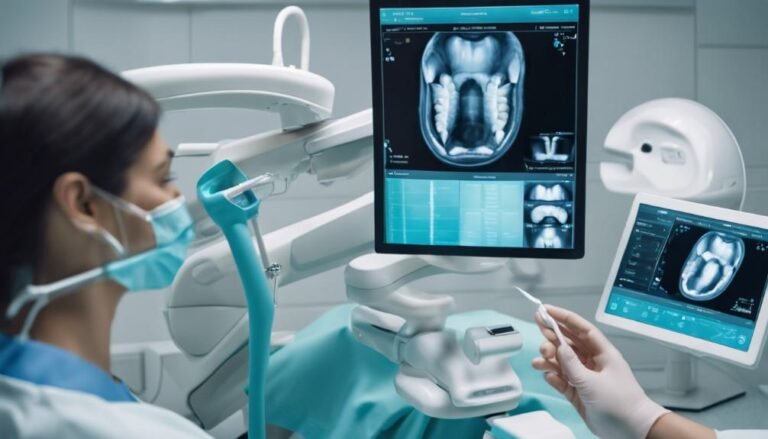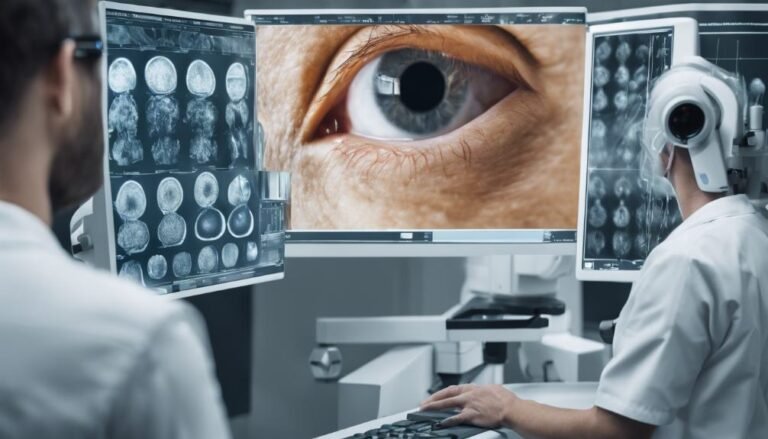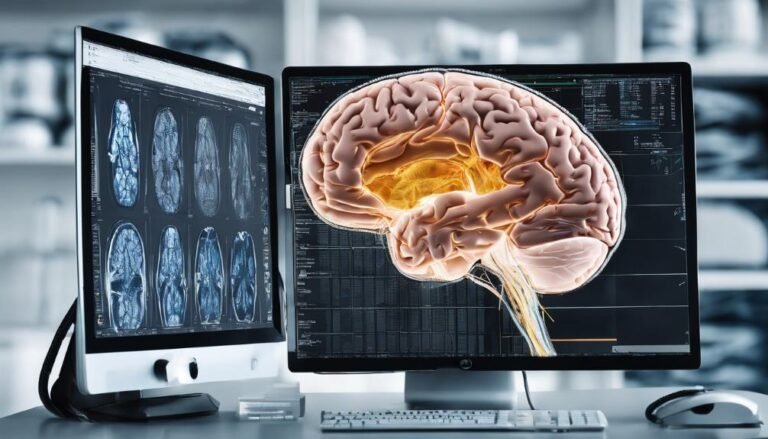AI in Health Economics
In the domain of Health Economics, AI stands as a silent driver of transformation, quietly revolutionizing the way decisions are made and resources are allocated in the healthcare sector. With its ability to crunch data, predict trends, and optimize processes, AI is reshaping the landscape of healthcare economics in ways that were previously unimaginable. The impact of AI in this field is profound, offering a glimpse into a future where efficiency, cost-effectiveness, and improved outcomes converge seamlessly.
Key Takeaways
- Optimizes resource allocation in healthcare.
- Enhances cost-effectiveness analysis.
- Develops accurate predictive models for economic trends.
- Shapes the future landscape of health economics.
- Drives significant advancements in healthcare cost management.
The Role of AI in Healthcare
AI plays a pivotal role in revolutionizing healthcare by enhancing diagnostic accuracy, optimizing treatment plans, and improving patient outcomes. One of the key ways AI achieves this is through the use of predictive analytics. By analyzing vast amounts of patient data, AI can predict potential health issues, recommend preventive measures, and even forecast disease progression. This proactive approach not only helps in early intervention but also saves costs in the long run.
In terms of cost savings, AI in healthcare has shown promising results. Predictive analytics powered by AI can identify high-risk patients who may require intensive care or interventions, consequently allowing healthcare providers to allocate resources more efficiently. By targeting interventions to those who need them most, healthcare systems can reduce unnecessary hospital admissions, streamline workflows, and ultimately save on healthcare expenditures.
The integration of AI and predictive analytics in healthcare not only improves patient care but also offers significant cost-saving opportunities, making it a valuable asset in the quest for more efficient and effective healthcare delivery.
Advantages of AI in Economics
Within the realm of economics, the utilization of artificial intelligence presents numerous advantages that can greatly impact various facets of the field. One key advantage is cost savings. AI can help economics professionals optimize resource allocation, streamline processes, and identify cost-effective strategies. By automating repetitive tasks and providing advanced data analysis, AI reduces the need for manual labor, ultimately lowering operational costs. This cost-saving aspect is particularly beneficial for organizations looking to maximize efficiency while minimizing expenses.
Another significant advantage of AI in economics is efficiency improvement. Artificial intelligence tools can process vast amounts of data at speeds far beyond human capabilities, allowing for quicker and more accurate decision-making. By leveraging AI algorithms, economists can analyze complex economic trends, forecast market changes, and identify opportunities for growth with enhanced precision. This efficiency improvement not only saves time but also leads to more informed and strategic economic planning.
AI Applications in Health Data
Utilizing advanced algorithms and data analytics, health professionals can harness the power of artificial intelligence to extract valuable insights from vast amounts of health data. Through sophisticated data analysis techniques, AI enables predictive modeling that can revolutionize healthcare decision-making.
By leveraging AI applications in health data, organizations can achieve significant cost efficiency and improved resource allocation.
Data analysis plays an essential role in uncovering patterns and trends within healthcare information, leading to more informed choices for both individual patient care and broader health system management. Predictive modeling, a key component of AI in health data, allows for the forecasting of disease outbreaks, patient outcomes, and healthcare trends based on historical data.
The integration of AI in health data not only enhances decision-making processes but also streamlines resource allocation by identifying areas where interventions are most needed. This targeted approach guarantees that limited resources are utilized effectively, optimizing healthcare delivery and improving patient outcomes.
Challenges of Implementing AI
Addressing the challenges of implementing artificial intelligence in healthcare requires a strategic approach and a thorough understanding of the complexities involved in utilizing advanced algorithms and data analytics. One prominent challenge is maneuvering the ethical dilemmas that arise from using AI in health economics. Issues such as bias in algorithms, accountability for decision-making, and ensuring patient consent and autonomy present significant hurdles.
Additionally, safeguarding data privacy is vital when integrating AI into healthcare systems. Protecting sensitive patient information from breaches and misuse is essential to maintaining trust and compliance with regulations like HIPAA.
The complexity of healthcare data further complicates AI implementation, as integrating disparate data sources while ensuring accuracy and reliability poses a substantial challenge. Furthermore, the need for interpretability and transparency in AI algorithms is critical for gaining acceptance and understanding from healthcare professionals and patients.
Overcoming these challenges demands a multidisciplinary approach that combines expertise in healthcare, data science, ethics, and legal frameworks to maneuver the intricate landscape of implementing AI in health economics.
Improving Healthcare Systems With AI
Understanding the intricacies of healthcare data integration and ensuring algorithm transparency are key aspects of leveraging AI to enhance healthcare systems.
AI-driven efficiency plays a vital role in improving healthcare systems by streamlining processes, optimizing resource allocation, and enhancing patient outcomes. Through advanced data analytics and machine learning algorithms, AI can analyze vast amounts of health data to identify patterns, predict outcomes, and personalize treatment plans. This not only enhances the quality of care but also leads to significant cost savings by reducing unnecessary procedures, hospital readmissions, and medication errors.
Moreover, AI can improve operational efficiency by automating administrative tasks, optimizing scheduling, and facilitating remote patient monitoring. These advancements not only free up healthcare professionals to focus more on patient care but also enhance the overall patient experience.
Future of AI in Health Economics
The integration of AI in health economics is poised to revolutionize cost-effectiveness analysis and resource allocation within healthcare systems. AI innovations are expected to play a pivotal role in shaping the future landscape of health economics by enhancing cost efficiency.
AI technologies can analyze vast amounts of healthcare data to identify patterns, predict outcomes, and optimize resource utilization. By leveraging machine learning algorithms, AI can assist in developing more accurate predictive models for healthcare costs and outcomes, leading to improved decision-making processes.
Furthermore, AI can streamline administrative tasks, automate repetitive processes, and enhance the overall efficiency of healthcare systems. Through AI-driven tools, health economists can gain valuable insights into cost drivers, patient preferences, and treatment effectiveness.
This data-driven approach enables policymakers and healthcare providers to make informed decisions that maximize cost efficiency while improving patient outcomes. As AI continues to advance, its integration into health economics is expected to drive significant advancements in optimizing resource allocation and improving the overall effectiveness of healthcare systems.
Conclusion
To sum up, AI in health economics is revolutionizing the way healthcare organizations operate, with its ability to analyze data and predict market trends. By harnessing the power of AI, healthcare systems can achieve cost-effective strategies and improve patient outcomes.
The future of health economics is bright, with AI paving the way for innovative solutions and efficient resource allocation. As the saying goes, 'The sky's the limit' when it comes to the potential impact of AI in healthcare.







